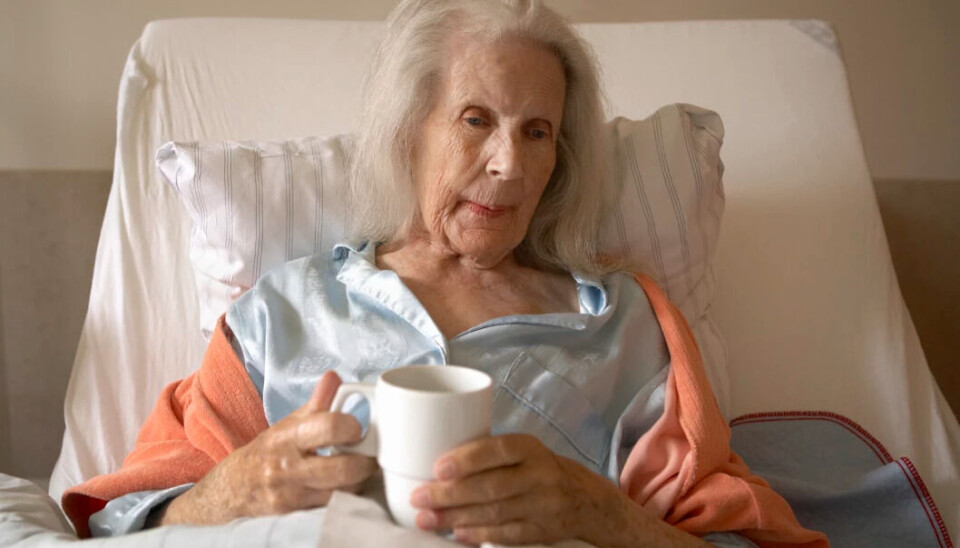
Half of those who live in nursing homes are lonely
According to a new Norwegian study, nurses make the elderly less lonely. “When staffing is low, there is only time for the routines,” one nurse says.
“Our study shows that loneliness is very common amongst the elderly in nursing homes,” Britt Moene Kuven at VID Specialized University in Bergen says.
188 residents of 27 different nursing homes were interviewed about their quality of life. The youngest was 65, the oldest 104. None had dementia.
The participants had spent an average of two and a half years in a nursing home.
“We did the interviews before the pandemic, so the results are not affected by the closure and visitor ban,” Moene Kuven tells sciencenorway.no.
The residents answered 120 questions. One part was about quality of life, with questions such as: Do you enjoy life? Do you look forward to things? Do you feel safe where you live?
More lonely than the general population
The second part was about the elderly's relationship with the nurses: Do you trust the staff? Are you taken seriously? Are you respected and listened to?
The residents' relationships with the health workers and other staff at the nursing homes was not included in the study.
Anxiety and depression were the next topic. Finally, the residents answered questions about loneliness.
Almost half of the residents said they were lonely.
In the general population, 11 per cent experience loneliness, according to the Living Conditions Survey by Statistics Norway (SSB).
A nursing home is a collective form of housing. It is still possible to be lonely when you are surrounded by others, according to the researcher.

Surrounded by people, and yet
“There are two types of loneliness. You are socially lonely if you have few people to be with. If you have many people around you, but do not have a close relationship with them, then we call it emotional loneliness,” Moene Kuven says.
The researchers did not distinguish between the two types of loneliness in the study.
Nina Green from south-eastern Norway has extensive experience as a nurse in nursing homes.
She had not expected there to be so much loneliness amongst residents in a nursing home as the study shows.
“You always have people around you when you live in a nursing home,” Green tells sciencenorway.no.
More common than anxiety and depression
The researchers were surprised that loneliness was more common than anxiety and depression. A total of 20 per cent were depressed, and 23 per cent had anxiety.
“We thought it was interesting, but also a bit sad. Because there are pills for depression and anxiety, but not for loneliness,” Moene Kuven says.
On the other hand, it is perhaps easier to do something about loneliness than depression and anxiety, she believes. Loneliness can be remedied through relationships with other people, and it is possible to achieve this even if you live in a nursing home.
The nurses are important
When the researchers combined the answers for quality of life and the relationship with the nurses, they got clear results.
“The nurses are very important to the residents' quality of life,” Moene Kuven says.
The elderly who had a good relationship with the nurses were less lonely.
“Nurses who work in nursing homes have reason to be proud of the work they do,” the researcher says.
25 per cent of the participants' quality of life was influenced by the interaction between resident and nurse, the researchers found when they analysed the responses.

“We have to take it to heart”
Nina Green thinks it's positive that nurses have such a big impact on the elderly’s quality of life.
“This is important. We nurses have to take it to heart. Maybe it doesn't take much for an older person’s quality of life to improve,” Green tells sciencenorway.no.
She used to work in a nursing home in a smaller town.
“There were many people who knew each other. In such cases, the nurses are not so important for the social aspect,” she says.
There was not much talk about the residents' loneliness amongst the staff.
“It's easy to label something as depression. It's easier to find medicines than to introduce environmental measures. A lot of this comes down to time and resources in everyday life,” Green says.
Important for good health
The study also shows that loneliness is harmful for the residents.
“This is something that the granting authorities should take to heart. They talk about how they will provide a better quality of life in older years. So they should consider that loneliness is even more harmful than anxiety and depression,” Moene Kuven says.
Quality of life is important for good health.
“Our study shows that investment in increased staffing, and training nurses in building good relationships, are important elements for improving the quality of life of elderly people in nursing homes,” the researcher says.
Time to see the patient
Moene Kuven teaches nursing education at VID Specialized University. She has been a nursing teacher for 26 years and has extensive experience in researching elderly patients in nursing homes.
When asked what it takes for the elderly to experience a good quality of life in a nursing home, she replies:
“It's about caring. And about the competency and ability to assess, not only amongst the nurses, but everyone who works in nursing homes. There must also be adequate staffing, which means that the nurses have the time and opportunity to see the individual patient.”
Moene Kuven believes it is important to see the individual patient's needs, wishes and values. The goal is care that takes the residents' individual preferences and their life stories into account, as well as supporting their strengths and resources.
In nursing homes, the elderly have lost some of their control, independence and the ability to make decisions about their own care. In order to give the residents the best possible quality of life, they must experience being taken seriously and being respected. They must experience being seen for the person they are, Moene Kuven argues.
“It's important to have time to wait for the elderly to fix their hair or button their shirt. But the reality is that nurses often have to hurry,” she says.
“Reality is not like that”
Nina Green started as a nursing assistant in homecare in 1997. At that point she worked both at home for the elderly and in a nursing home. When she became a nurse, she continued in her job until 2013. Since then, she has spent shorter periods working in nursing homes.
“There is currently a lot of writings in the media about nurses having little time to do their work. But this is not a new phenomenon. We didn't have better time and resources before,” Green says. “We often only had time to do what was most necessary for each patient. I would have liked to have had more time, but I knew that someone else was waiting.”
She believes this is down to resources, but also about the nurses themselves.
“It comes down to us as nurses too. If we have it in us to do a little extra for the elderly. But mostly, this is an issue concerning resources. There should be far more resources in nursing homes. When staffing is low, there is only time for the routines,” Green says. “And so they sit alone in their rooms.”
When she trained as a nurse, she experienced a great focus on care, empathy, seeing and being there for the patient.
“You take that with you when you start working. But then you realise that reality is not like that,” Green concludes.
———
Translated by Alette Bjordal Gjellesvik.
Read the Norwegian version of this article on forskning.no
Reference:
Kuven et al. ‘Quality of life and nurse–patient interaction among NH residents: Loneliness is detrimental, while nurse–patient interaction is fundamental’, Journal of Clinical Nursing, 2023. Abstract.





































